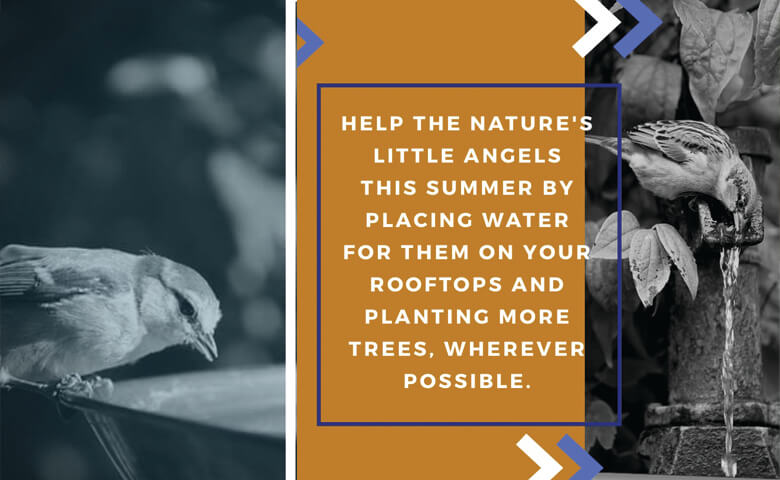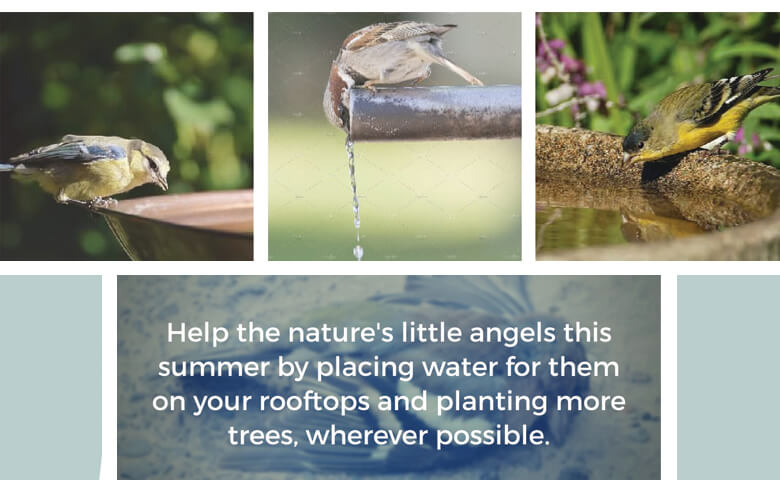Every living being enjoys the sight of lovely birds soaring through skies and rising above the earth. They are one of the integral parts of ecology. There are more than 10,000 species of birds across the planet and they are the prominent form of animal life that we come across. A study by Stanford University biologists has forecasted that ten percent of all bird species are expected to vanish by the year 2100, and another 15 percent could be on the threshold of extinction. In fact, varied species have already gone extinct over the past century.
Human involvement together with climate change, urbanization is considered one of the largest threats to wildlife. Cell phone tower radiations, global warming, pollution, etc. have troubled the natural ecosystems of the birds leading which ultimately results in diseases and deaths. Birds, pretty creatures, are mainly depending on trees and water bodies, have encountered a shocking decline in numbers.
In Indian Vedas which defines Dharma as a moral duty one has to perform to protect the other form of life especially which are weaker than them – be it birds, trees, animals, or people. However, we see many jostling to temples, observing fasts and performing havans – to continue the rituals of their ancestors as their Dharma. The performance of such activities is only targeted to attain peace. But the real heroes who believe in real Dharma are also there; those get the blessings of these innocent creatures and even set examples for others.
Here are some NGOs and communities in India, from east to the west, are taking small but significant steps that are helping wildlife especially birds.


For the past four years, the Yashodhara Foundation, a Nagpur-based NGO, is working for awaking people regarding the importance of birds and even tells the ways of how to survive its population. They not only built 1000 nests, which they distributed to residents, early this year but displayed these nests during events and exhibitions. And the main thing when people register themselves for a nest, the NGO representative goes to their house to install it for them.
Kokrebellur, a Karnataka village in the Mandya district, is one of the 21 popular nesting spots for spot-billed pelicans, a bird which is characterized by a long beak and a large throat pouch used for catching prey. Actually, the village is close to Thylur, a watering spot, which attracts these birds for their food as it is full of fishes. For more than a decade, this village has adopted the pelican as their pet. They think these birds as part of their ancient heritage. They are even eagerly waiting for their return during the breeding season. A rich source of phosphorous and potassium is not any fertilizer but the bird’s droppings which in turn is very helpful for agriculture.
During Makar Sankranti celebrations glass-coated strings of bloody sky flying kites take the lives of thousands of birds. There are many communities that get together to rescue the birds every year during this season. Fortunately, this year NGOs and activists across Pune, Thane, and Mumbai, armed with the social network and other coordinated approaches to rescuing the birds. In Pune alone, there are four NGOs and 600 activists who spring up to handle the situation.
Similarly, there is an NGO named Prayaas Corps, a non-profit based in Jaipur. It has initiated varied programs running for the well being of the birds and stray animals. Hanging earthen pots from trees are the main services provided by this NGO. The ‘Parinda’ program. Prayaas, mainly works in summer as it believes that in this scorching heat, animals are often left out and it is the scarcity of water which made the birds suffer a lot. The programs by Prayaas are a great initiative that not only establishes a feeling of love and care towards animals and other beings but also restores the faith in humanity.
Humanity means in real sense caring others and helping others whenever and wherever possible. Similarly, Dera Sacha Sauda supporters under the virtuous guidance of Saint Gurmeet Ram Rahim Singh Ji Insan serve this purpose globally. Birds Nurturing is one of the 134 causes of the compassionate welfare works of the volunteers of Dera Sacha Sauda which is undertaken under the supervision of Baba Ram Rahim. It has been working for the preservation of sparrow’s house, their food, water. The specific feature is that this organization does not work from one native place but the volunteers work from all over the world.
To inspire others this NGO made the world’s ‘Largest Birds Nurturing Mosaic’ using various food grains to spread the message of saving the birds. This huge creation that spread across 20,340 square feet in Haryana, Sirsa at Shah Satnam Ji Dham. This project was made possible by 304 people (artists) who contributed to the creation of this world record-breaking food grain Birds Nurturing Mosaic. The quantities of the different food grains used are as given below:
Wheat – 3046.35 kilograms
Black dal – 83.04 kilograms
Green dal – 91.78 kilograms
Corn – 106.07 kilograms
Red moong dal – 100.87 kilograms
Jowar- 34 kilograms
Bajra- 17.44 kilograms
Mustard- 166.99 kilograms
Chana dal- 90.94 kilograms
Total foodgrains used- 3737.48 kilograms
Disciples of Dera Sacha Sauda avail food and water for the birds on rooftops of homes or on the trees, mainly during the scorching summers. The tree is the main habitat of these creatures and Dera Sacha Sauda set many records in Tree plantation by planting 44 million saplings till date.
This article aims to create awareness for the conservation of common birds and help people in conserving them, which are a vital part of the ecosystem. People must be encouraged to adopt nest boxes and feeders to help them create bird-friendly habitats.
Birds are of highly significant not only for the lives of humans but also an agent of scattering various seeds, fish eggs, microorganisms, etc. from one place to another. In this way facilitate interaction between various forms across ecosystems. They are importantly maintaining an ecological balance and a crucial link in the varied food chains.
The common man must coordinate with other NGOs working for birds to contribute to saving these blessings of the ecosystem so that the ideal environment can be made more conducive for birds. Along with this one can set up feeding places and water baths for birds and can fill it daily. One must try to spread awareness about the importance of birds and ways through social media, academic institutions.
All organizations and communities must aim at creating wildlife-friendly habitats and involve the general being in the conservation movement to save India’s rich biodiversity. To involve the common man in the conservation movement, let us gift a Nest box or a Birdfeeder next time when you are confused while choosing a gift for your loved ones. In all sorts of gardens and balconies, whether it is simple or sophisticated, can enjoy the pleasures of birds feeding and can do it a bit for conservation. Our little effort will enable us to listen to the soul-soothing chirping of birds on the roof of our house or outside the window. We need to work with the above mentioned NGOs. Let’s pledge and do it by bird nurturing to feel lightened from all the burdens of daily humdrum.

